Buckle up, kids. It’s time to air some dirty laundry.
First, a little background: As a practicing lawyer, I’ve had to keep my mouth shut about a lot of things. Some of it is pretty straightforward, e.g., privileged communications from my client. Other things are much murkier, e.g., deciding when to speak up about the petty corruption and political favoritism that I routinely witness in the 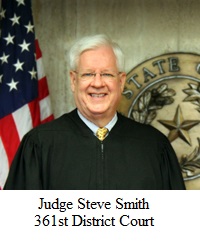 courtroom.
courtroom.
If you follow this blog, you might assume that I automatically blow the whistle every time I see judicial chicanery, but I don’t. I learned years ago (and the hard way) that judges are often quick to retaliate. When I speak up, there is a strong chance that one of my clients will suffer for it. I once criticized U.S. District Judge Vanessa Gilmore in Houston for some grossly inappropriate comments that she made in the courtroom, and 361st District Judge Steve Smith decided to avenge her by retaliating against one of my clients in a totally unrelated case in Bryan. The judiciary is a fraternity, after all, and they protect their own.
On the other hand, there comes a point when playing nice is no longer good enough, because the frat boys just keep hurting your clients in order to help their friends. I reached my boiling point last week, so today I’m going to air some dirty laundry that I’ve been sitting on for years.
PLAYING FAVORITES
This morning I filed a judicial misconduct complaint against 85th District Judge Kyle Hawthorne of Bryan, and the complaint is a case study in the sort of petty corruption and political favoritism that I routinely encounter in Texas 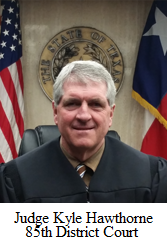 courts. In this excursion, we’ll go all the way to the Texas Supreme Court and back, and yours truly will LawFlog various deserving judges and lawyers along the way.
courts. In this excursion, we’ll go all the way to the Texas Supreme Court and back, and yours truly will LawFlog various deserving judges and lawyers along the way.
Before I get into the details, let me start with a disclaimer: I like Kyle Hawthorne. He is active in the Boys and Girls Club of Brazos Valley, and he is an overall good guy, thus I took no pleasure in filing the misconduct complaint. The rest of the judges that I mention today? I should have burned them a long time ago.
In a very real sense, Judge Hawthorne is merely a product of his environment, namely the “good old boy” legal culture in Texas (and elsewhere) that expects judges to do favors for their friends, political supporters, and former law partners. I doubt that it ever occurred to Judge Hawthorne that he was doing something wrong by favoring his former law partner, but then he has not been representing clients who suffer from his favoritism. Here’s an excerpt from the misconduct complaint:
On June 26, 2018, I learned that Judge Hawthorne is still using an email account hosted by his former law firm, and apparently he uses the address for judicial business. I have enclosed a letter to Judge Hawthorne wherein I am seeking emails to and from that address pursuant to Rule 12 of the Texas Rules of Judicial Administration.
Judge Hawthorne should have cut ties to his former law firm when he assumed judicial office, and his continued use of the firm email address creates at least some appearance of impropriety. Surrounding circumstances, however, create a significant appearance of impropriety. Judge Hawthorne has earned a reputation for favoritism toward attorney Jay Goss, his former law partner, and I have witnessed some of that favoritism firsthand.
By itself, the email account may not seem like a big deal. When combined with a history of blatant favoritism toward his former law firm, however, the arrangement really starts to stink. Does Judge Hawthorne still have a financial connection to the firm? Is he secretly communicating ex parte with his former partners? Probably not, but I should 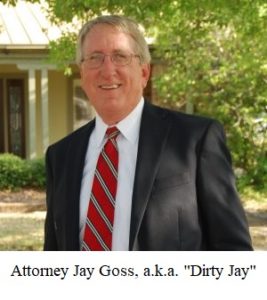 not have to wonder, and neither should my clients.
not have to wonder, and neither should my clients.
Here’s the backstory: In 2015, my friend and fellow lawyer Bill Youngkin represented three defendants in a real estate dispute before Judge Hawthorne, while the plaintiff was represented by the judge’s former law partner, Jay Goss, and Houston attorney Karl Hoppess.
Bill once told me that Jay was “the most convincing liar I’ve ever known,” and it’s an apt description. Unlike Robertson County shyster Bryan F. “Rusty” Russ, Jr., who is a prolific liar but not a particularly effective one, Jay is one of the smoothest liars I’ve ever heard. He tells so many lies so quickly and convincingly that other lawyers (e.g., me) struggle to keep up with them. Incidentally, that’s a real problem if you’re in front of Judge Travis Bryan, because Judge Bryan famously refuses to read the pleadings in civil cases. He enters the courtroom without a clue about the case, Jay lies about the facts and the law at 100 miles per hour, and Judge Bryan gobbles it all up like a starving chicken, then screws up the case accordingly.
But I digress.
In the case before Judge Hawthorne, Bill filed a motion for summary judgment because the plaintiff had no evidence to support his claims of real estate fraud. One day before the deadline to respond to that motion, Jay amended the lawsuit to name Bill as a defendant, and he simultaneously filed a motion to disqualify Bill from the case. Let me translate: Jay’s client was about to lose on summary judgment, so Jay sued his opposing counsel to gum up the case and buy himself more time.
The claims against Bill were ridiculous. Jay’s client sued Bill for breach of contract, for example, even though Bill was not a party to the contract, had never been a party to the contract, and was never even accused of being a party to the contract. Jay’s client sued Bill for fraud because (1) Bill announced a settlement agreement years earlier in open court in a related lawsuit and (2) Bill’s clients supposedly did not comply with the settlement agreement, therefore Jay theorized that (3) Bill’s clients never intended to comply with the settlement agreement, and (4) Bill must have known that they never intended to comply, therefore he was somehow a party to a fraud.
I entered the case on behalf of Bill and the other defendants, and I immediately filed a motion to dismiss the bogus claims against Bill. For more than 100 years, Texas courts have ruled that you cannot sue opposing counsel for statements made in the courtroom, and for as long as anyone can remember, courts have held that you cannot sue someone for breach of contract unless he or she is a party to the contract. Judge Hawthorne ignored the law and denied the motion to dismiss, so we appealed to the Tenth Court of Appeals in Waco.
THE WORST APPELLATE COURT IN TEXAS
On April, the legal publication Law360 quoted me as saying that the Tenth Court was the “least respected appellate court in the state, for good reason.” I said it alright, and I stand by it.
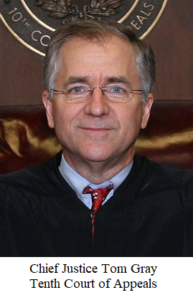 Let me begin with one of the worst examples of political favoritism I’ve ever seen in any court. In Clayton Williams Energy, Inc. v. Gloria Neal, et al., Cause No. 14-001392-CV-361 (361st District Court of Brazos County), College Station attorney Gaines West switched sides during the lawsuit, representing new clients against his former clients in the same case. And West is no ordinary attorney. He formerly served as the chairman of both the Texas Supreme Court’s Grievance Oversight Committee and its Board of Disciplinary Appeals, and even now he advertises himself as a legal ethics expert.
Let me begin with one of the worst examples of political favoritism I’ve ever seen in any court. In Clayton Williams Energy, Inc. v. Gloria Neal, et al., Cause No. 14-001392-CV-361 (361st District Court of Brazos County), College Station attorney Gaines West switched sides during the lawsuit, representing new clients against his former clients in the same case. And West is no ordinary attorney. He formerly served as the chairman of both the Texas Supreme Court’s Grievance Oversight Committee and its Board of Disciplinary Appeals, and even now he advertises himself as a legal ethics expert.
That’s part of what made the case so ironic. It shouldn’t take a lawyer to understand that you cannot switch sides in the same case, so I filed a motion to disqualify West. The decision for 361st District Judge Steve Smith should have been a no-brainer, but Judge Smith has his own well-documented history of favoritism and political games (more on that below). He denied the motion, so we filed a petition in the Tenth Court to force West’s recusal.
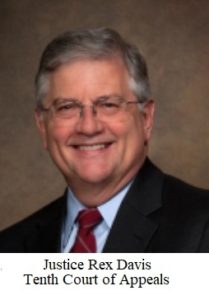 The Tenth Court ordered West to respond to our petition, then it played one of the oldest tricks in the book: it denied the petition without an explanation. Why? When an appellate court wants to do something indefensible, the court doesn’t try to defend it. Instead the appellate court just affirms the trial court without an explanation, virtually guaranteeing that a higher will not take up the case. After all, higher courts look for erroneous statements of the law, and lower courts cannot erroneously state the law when they make no statement at all.
The Tenth Court ordered West to respond to our petition, then it played one of the oldest tricks in the book: it denied the petition without an explanation. Why? When an appellate court wants to do something indefensible, the court doesn’t try to defend it. Instead the appellate court just affirms the trial court without an explanation, virtually guaranteeing that a higher will not take up the case. After all, higher courts look for erroneous statements of the law, and lower courts cannot erroneously state the law when they make no statement at all.
The entire opinion authored by Justice Al Scoggins reads as follows: “Relator’s petition for writ of mandamus is denied.” That’s it, nothing more. The Tenth Court had circled the wagons to protect a politically-influential lawyer, never mind the severity of his misconduct.
On the other end of the spectrum is my client, Bill. Chief Justice Tom Gray and Justices Rex Davis and Al Scoggins are the only judges on the court, and Bill made the mistake of supporting other candidates against Chief Justice Gray and Justice Scoggins. It has cost him and his law firm dearly.
 In the appeal from Judge Hawthorne’s decision, the Tenth Court predictably ruled against Bill in an opinion authored by Justice Davis. The court badly misrepresented the facts, which is another common tactic when an appellate court wants to do something shady (if an appellate court misstates the law, a higher court will likely take up the case and reverse it, but nobody cares if the appellate court misstates the facts). According to the opinion, for example, I supposedly failed to raise a critical issue in the trial court, therefore it could not be considered on appeal. In a motion for rehearing, however, I directed the court’s attention to the trial court transcript and clerk’s record, where I unequivocally raised the issue verbally and in writing.
In the appeal from Judge Hawthorne’s decision, the Tenth Court predictably ruled against Bill in an opinion authored by Justice Davis. The court badly misrepresented the facts, which is another common tactic when an appellate court wants to do something shady (if an appellate court misstates the law, a higher court will likely take up the case and reverse it, but nobody cares if the appellate court misstates the facts). According to the opinion, for example, I supposedly failed to raise a critical issue in the trial court, therefore it could not be considered on appeal. In a motion for rehearing, however, I directed the court’s attention to the trial court transcript and clerk’s record, where I unequivocally raised the issue verbally and in writing.
The Tenth Court asked Jay’s client to respond, and he could not deny what was plainly in the record, yet the Tenth Court arbitrarily refused to correct its decision. Fortunately, the Texas Supreme Court took up the case and unanimously reversed the Tenth Court on April 27, 2018. The Supreme Court sent the case back to Judge Hawthorne to determine the amount of mandatory attorney fees and sanctions.
BACK TO MAYBERRY
After getting reversed unanimously by the Supreme Court, you’d think Judge Hawthorne might be a little more circumspect about his favoritism. No such luck.
At a June 28, 2018 hearing on fees and sanctions, Jay correctly argued that attorney fees had to be determined according to the evidence that I had already presented prior to the interlocutory appeal. According to that undisputed evidence, my client was entitled to $17,290 in attorney fees. Jay nonetheless argued that I should only be awarded attorney fees attributable to trial court proceedings, i.e., $8,290.80. Thus at a bare minimum, my opposing counsel conceded that my client was owed $8,290.80 in attorney fees.
Notwithstanding that, Judge Hawthorne awarded only $5,880.00 in attorney fees in a letter order dated July 6, 2018, i.e., he awarded $2,410.80 less than the lowball amount that even Mr. Goss conceded was due. As a sanction for filing the frivolous claims, he awarded a paltry $250 sanction.
Furthermore, Judge Hawthorne denied my request for fees and costs related to the June 28, 2018 hearing, including the $775.78 it cost me to travel from New York to Bryan. He did so even after I submitted case law showing that I was entitled to receive fees and costs related to a post-remand hearing.
Message received, your honor, loud and clear: “This here is Brazos County and we don’t need no stinkin’ law — we’ll do things however we want.”
MORE DIRTY LAUNDRY FROM THE TENTH COURT
The Tenth Court is pretty crafty with its dirty tricks, always hiding behind the facade of plausible deniability. A few years ago, for example, a colleague represented a public official against Chief Justice Gray. Shortly thereafter, the Tenth Court ordered one of his other cases (i.e., a totally unrelated case) to mediation.
That means nothing to the average citizen, so allow me to explain. I’m not aware of another case where the Tenth Court ordered an appeal to mediation on its own initiative, as it did in this instance. It may have happened, but it is very rare. Furthermore, the case had already been to mediation at the trial level and mediation had failed, hence the trial and the appeal. By ordering the case to mediation again, however, the Tenth Court delayed the case for months and cost my colleague’s clients thousands of dollars in additional mediation fees and attorney fees.
The public would never pick up on these subtleties, but those of us inside the game knew exactly what was happening: the Tenth Court was punishing innocent clients in order to send a message to their attorney, i.e., “If you cross one of our judges, we will make you regret it.”
In another instance, a different colleague (a former elected official) asked me to take over an appeal because the Tenth Court’s judges considered him a political enemy, and he was afraid they would retaliate against his client. (After today, I don’t think other lawyers will be asking me to take over appeals in the Tenth Court).
The Tenth Court is also incredibly slow, at least when it wants to be. One case has been pending for almost four years even though the appeal is unopposed. The briefing in that case was completed three years ago, the appellee never responded, and the case was finally submitted for decision on January 28, 2016, yet the court will not make a decision. That illustrates another way that the Tenth Court judges retaliate: if they don’t like you or your attorney, they may just leave your case in limbo for years.
And then there’s the problem of incompetence. Lest you think that I’m complaining about cases that I lost, let’s consider a case that I won. In In re John C. Paschall, Case No. 10-12-00339-CV, I represented the plaintiffs against former Robertson County District Attorney John Paschall, who was serving as the executor of an estate. As a result of the evidence that we uncovered, Paschall pleaded guilty to pilfering hundreds of thousands of dollars from the estate and had to surrender his law license.
Before Paschall was exposed, however, he asked the Tenth Court to block my request for estate documents, and the Tenth Court denied his request. In a February 7, 2013 opinion, Justice Scoggins described the case as a “will contest” and analyzed it accordingly. The problem? My clients were not contesting the will, ergo it was not a “will contest.” [Update 07/12/2018: My clients challenged a trust and argued that if the trust did not exist, then the will failed. Justice Scoggins got it backwards, stating that if the will failed then the trust failed.] Worse, Justice Scoggins had been a probate judge for most of his career before his election to the Tenth Court, ergo he should have been an expert on what is or isn’t a “will contest.” I didn’t say anything at the time because my clients won, but that’s the sort of rank incompetence that I’ve come to expect from the Tenth Court.
And let’s not forget that Chief Justice Tom Gray was caught on video ten years ago secretly entering the offices of then-Justices Felipe Reyna and Bill Vance, his avowed enemies, after hours and without their knowledge or permission. Under most circumstances, that would be called breaking and entering. Instead of referring the matter to prosecutors or a psychiatrist, however, the State Commission on Judicial Conduct gave Chief Justice Gray an “admonition,” i.e., the lowest form of punishment.
THE WORST JUDGE IN BRAZOS COUNTY
Full disclosure: I have never cared for 361st District Judge Steve Smith, who ranked at the bottom of the last survey of Brazos County lawyers. My first experience with him was the incident that I described above, i.e., when he retaliated against me and my client because of something that happened in Houston and was none of his business. Afterwards, I met with him in his chambers to make peace, and we shook hands and agreed to let bygones be bygones. Then I found out that he was still talking trash about me behind my back. I guess I should not have been surprised, because Judge Smith is the chief gossip of the Brazos County Courthouse, frequently behaving like a back-stabbing little seventh-grade girl.
Judge Smith favors the popular kids, and I previously mentioned how he covered for Gaines West, allowing him to switch sides in a pending lawsuit. In a sane world, Judge Smith would have bounced West from the case and referred him to state bar prosecutors. In Judge Smith’s courtroom, however, there’s not a lot of sanity to be found.
Last year, for example, I appeared before Judge Smith on behalf of the same clients that I was representing before Judge Hawthorne. The two cases were related, and Jay Goss and Karl Hoppess represented the opposing parties. During a March 28, 2017 hearing, Jay was forced to admit that he had filed suit on behalf of people who were not his clients, i.e., people who did not know that he was purporting to file claims on their behalf because he had never spoken to them. Read the transcript for yourself. Jay was also forced to admit that he subsequently solicited some of those same people and asked for permission to represent them, although others had never given permission for him to file suit.
In Texas, that’s called barratry, and it’s more than a violation of the bar rules: it’s a third-degree felony punishable by up to ten years in prison for each violation. Did Judge Smith refer Jay to the district attorney’s office or to state bar prosecutors? Of course not. Jay is one of the popular kids, so Judge Smith allowed him to continue representing people who were not and are not his clients, some of whom do not know that a lawsuit is being prosecuted in their respective names.
And people wonder why I’m so disillusioned.
A CHALLENGE TO THE GOOD-OLD-BOY JUDGES OF BRYAN AND WACO
Nowadays most of my practice is in other parts of Texas or in other states, so I don’t have as much to fear from the judges in Waco and Bryan. For the record, neither Bill Youngkin nor Matt Doss (nor any other lawyer) knew that I would be publishing this post. If Bill or Matt had known in advance, they would have tried to stop me.
That said, I have a challenge for Chief Justice Gray, Justice Davis, Justice Scoggins, and Judge Smith: man up. Instead of trying to retaliate against me, Bill, Matt, or our respective clients with dirty little tricks behind the scenes, meet me face to face in a political debate. You pick the time and the place, and we’ll let the voters decide whether I’m making this stuff up.
07/09/2018